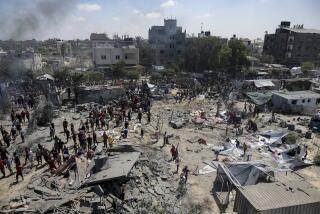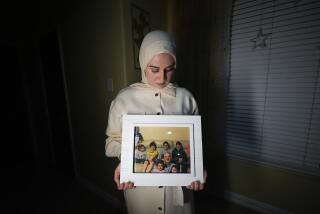U.S. Forces Catch Closest Hussein Aide
- Share via
WASHINGTON -- U.S. forces have captured Saddam Hussein’s most trusted aide, Pentagon officials said Wednesday, nabbing a man who could point the way to the ousted Iraqi president and his two sons.
Gen. Abid Hamid Mahmud Tikriti, described by a U.S. defense official as “the Condoleezza Rice of the Baath Party,” was seized Monday in central Iraq. He was Hussein’s national security advisor, personal secretary and top bodyguard, officials said.
“Other than the two sons, he is the closest to Saddam,” the defense official said. “He should know the fate of Saddam and the two sons.”
After Hussein and sons Uday and Qusai, Mahmud is the highest-ranking official on the U.S. Central Command’s list of the top 55 wanted Iraqis. He is the ace of diamonds in the Pentagon’s deck of “most-wanted” cards.
Mahmud, who was a fixture by Hussein’s side, controlled access to the president for anyone but immediate family members, defense officials said on condition of anonymity. Because he was a confidant of the ousted leader, he might also be able to provide details on any Iraqi weapons of mass destruction, none of which have been found after more than two months of searches.
Military officials, who offered no details on his arrest, kept the capture secret until news leaked out Wednesday, apparently hoping to prevent Hussein, if alive, from discovering that his closest aide was being interrogated.
Military officials in Iraq also said that troops raided two farmhouses in central Iraq on Wednesday, arrested a band of Hussein loyalists and recovered about $8.5 million that occupation authorities believe was being used to pay bounties to anyone killing U.S. soldiers.
The effort to learn Hussein’s fate has taken on increased urgency amid a series of attacks on U.S. troops that some officials have speculated might be directed by Hussein. But Bush administration officials insist there is no evidence that Hussein, or anyone else, is directing the assaults in central Iraq.
“There’s a little debate on that,” Defense Secretary Donald H. Rumsfeld told reporters at the Pentagon. “I don’t know anyone who is persuaded and has a real strong conviction that there is anything approximating a national or a regional organization that is energizing and motivating these attacks. There’s undoubtedly small elements of 10, 12, 15, 20 ... people.”
Even if Hussein is not directing the attacks, U.S. officials are eager to end the widespread perception among Iraqis that he is. His disappearance has undermined U.S. credibility with the Iraqi people, and large segments of the population are fearful that he will return.
While downplaying talk of coordinated attacks, the U.S. has focused troops on a small region of central Iraq where Hussein’s Sunni Muslim-dominated Baath Party remains popular. The region includes the capital, Baghdad, Fallouja to the west and Tikrit to the north, the hometown of Hussein and Mahmud.
Over the last eight days, soldiers from the Army’s 4th Infantry Division have led 56 raids and detained more than 50 suspected Baath Party members, fighters with the fanatical Fedayeen Saddam and other Hussein loyalists, Maj. Gen. Ray Odierno told Pentagon reporters in a videoconference from Iraq.
The raids were based on tips from Iraqis who claimed that loyalists of the regime were paying bounties to mercenaries who kill U.S. troops, Odierno said.
According to Iraqi tipsters, he added, “what they do is they operate in cash, and ... they try to recruit individuals and will say, ‘If you kill Americans, we’ll pay you so much money.’ ”
The attacks on Americans appear to be well funded. In two raids on farmhouses south and west of Tikrit on Wednesday, soldiers from the 4th Infantry encountered armed guards and detained more than 20 people with suspected ties to the former regime, officials said.
The two Wednesday raids netted $8.5 million in U.S. currency, an undetermined amount in euros and British pounds, more than $1 million in jewels, new Russian-made night-vision goggles, sniper rifles, uniforms and equipment for Hussein’s personal security force.
More than 15 people tied to Hussein’s special security forces, including one of his bodyguards, were detained in the two raids, Odierno said. Up to 30 additional Special Republican Guard troops were captured at two other sites Wednesday, he said.
Soldiers at a separate checkpoint Wednesday stopped a driver who was trying to flee with more than $800,000 in U.S. bills in his car, Odierno said.
In many cases, those being detained are not Iraqis, Rumsfeld said, but citizens of Syria and other Mideast nations.
Lt. Gen. David McKiernan, commander of ground forces in Iraq, said recently that the U.S. underestimated the importance that Iraqis place on knowing Hussein’s fate. That is why forensic experts recently returned to the site of a house in the Mansour district of Baghdad that was bombed during the war. McKiernan said they were searching for DNA evidence that Hussein had been killed.
Many Iraqis believe that the Americans cut a deal with the now-deposed president, and they believe that he has been granted refuge in the United States. Some Iraqis are fearful about completely disavowing their past because they are worried that Hussein will return.
“Now that the crimes against humanity committed by Saddam Hussein have been exposed, why aren’t the Americans serious about trying to catch him?” asked Ali Salman, 56, a retired Arabic teacher in Baghdad. “The people say, ‘There is a deal, that something is fishy, the Americans have a secret deal with Saddam.’ This is what the people are saying.”
Furat Ali, a lawyer, said, “The Iraqi people are full of fear for Saddam Hussein.”
That concern has American officials thinking creatively. Rumsfeld indicated that U.S. authorities might be willing to bargain with Mahmud and others, granting them leniency in exchange for information on the fate and whereabouts of the Iraqi leader.
“We’ve thought about it a good deal,” Rumsfeld said. “And it is a perfectly reasonable proposal ... and the lawyers have been considering it. And the question is, what do you get for what you give?”
Times staff writer Michael Slackman in Baghdad contributed to this report.
More to Read
Sign up for Essential California
The most important California stories and recommendations in your inbox every morning.
You may occasionally receive promotional content from the Los Angeles Times.










